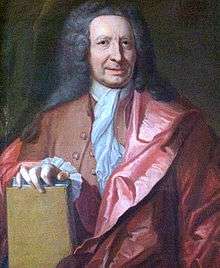
Olaus Rudbeck
Olaus Rudbeck (also known as Olof Rudbeck the Elder, to distinguish him from his son, and occasionally with the surname Latinized as Olaus Rudbeckius) (12 December 1630 – 17 September 1702) was a Swedish scientist and writer, professor of medicine at Uppsala University and for several periods rector magnificus of the same university. He was born in Västerås, the son of Bishop Johannes Rudbeckius, who was personal chaplain to King Gustavus Adolphus, and the father of botanist Olof Rudbeck the Younger. Rudbeck is primarily known for his contributions in two fields: human anatomy and linguistics, but he was also accomplished in many other fields including music and botany. (He established the first botanical garden in Sweden at Uppsala, called Rudbeck's Garden, but which was renamed a hundred years later for his son's student, the botanist Carl Linnaeus.)
Human anatomy
Rudbeck was one of the pioneers in the study of lymphatic vessels. According to his supporters in Sweden, he was the first to discover the lymphatic system and is documented as having shown his findings at the court of Queen Christina of Sweden in the Spring of 1652. However, he did not publish anything about it until the fall of 1653, after Thomas Bartholin, a Danish scientist, had published a description of a similar discovery of his own. (For other early discoverers of the lymphatic system, see Gasparo Aselli and Jean Pecquet).

Olof Rudbeck the Younger
Olof Rudbeck the Younger or Olaus Rudbeckius junior (15 March 1660, Uppsala – 23 March 1740) is a Swedish explorer, scientist, and the son of Olaus Rudbeck Sr. He succeeded his father as professor of medicine at Uppsala University. Serving aside Lars Roberg, he specialized in anatomy, botany, zoology, and pharmacology, while Roberg gave lectures in medicine, surgery, physiology, and chemistry.
Young Rudbeck was an able botanist and ornithologist who took his doctor's degree in Utrecht in 1690. He traveled to Lapland in 1695, joining an expedition commissioned by the King, for which his mission was to study nature, the mountains in particular. He returned with an album of beautifully colored pictures of birds, flowers and scenery, for which he is best remembered.
At the beginning of the eighteenth century, Rudbeck Jr. turned his attention away from nature studies to speculation about the relationship between Sami and Hebrew languages. To honor his accomplishments (and posthumously, those of his namesake father) he was ennobled in 1719 by Queen Ulrika Eleanora as a "naturalized nobleman" (noble family of Rudbeck, nr. 1637). His student, the botanist Carl Linnaeus (1707–1778), named a genus of flowers Rudbeckia in honor of him and his father.
Podcasts:

